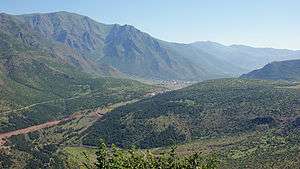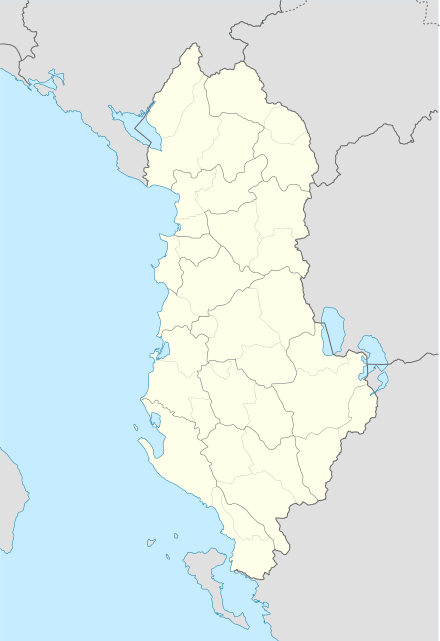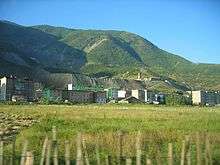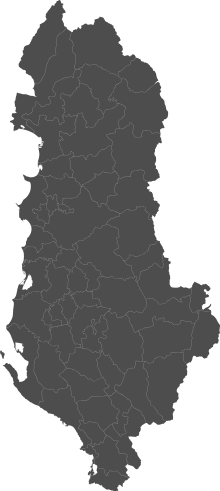Bulqizë
Bulqizë (IPA: [bulciz], definite Albanian form: Bulqiza) is the name of both a town and a municipality in Dibër County, eastern Albania. It was formed during the 2015 local government reform by the merger of the former municipality of Bulqizë with the adjacent municipalities of Fushë-Bulqizë, Gjoricë, Martanesh, Ostren, Shupenzë, Trebisht and Zerqan. The seat of the municipality is the town also called Bulqizë.[1] The total population is 31,210 (2011 census),[2] in a total area of 678.73 km2.[3] The population of the former municipality at the 2011 census was 8,177.[2]
Bulqizë | |
|---|---|
 Bualli Pass with Bulqizë in the distance | |
 Emblem | |
 Bulqizë | |
| Coordinates: 41°29′N 20°13′E | |
| Country | |
| County | Dibër |
| Government | |
| • Mayor | Lefter Alla (PS) |
| Area | |
| • Municipality | 678.73 km2 (262.06 sq mi) |
| Population (2011) | |
| • Municipality | 31,210 |
| • Municipality density | 46/km2 (120/sq mi) |
| • Municipal unit | 8,177 |
| Time zone | UTC+1 (CET) |
| • Summer (DST) | UTC+2 (CEST) |
| Postal Code | 8401-8402 |
| Area Code | (0)219 |
| Vehicle registration | AL |
| Website | Official Website |
Bulqizë lies in the lower north-east of Albania and shares a border with Macedonia. The municipalities of Mati and Tirana lie to the west while at the south is the municipality of Librazhd. The administrative center is the town of Bulqizë with 16768 inhabitants. The locality has 1 municipality and 7 communes; Fushë-Bulqizë, Zerqan, Shupenzë, Gjoricë, Ostren, Trebisht and Martanesh and the town of Krasta with 5969 inhabitants. In both Bulqiza and Krasta are significant sources of chromium, which supports most of the economy of the area. Despite being rich in resources, the quality of life is very low and many live in poverty. Future economic development is currently centered on eco-tourism with the development of the new road of Arbëri it is expected to become a popular tourism destination
History

The people of this region has always been a great example of resistance, against the enemy, Ottoman, Serbian, Italian and so on, because the valley of Bulqize is situated in a crossroad, and is the main entrance to go to the inner side of Albania. It is very famous the Battle of Vajkali Plain, (April 1465), Gjorica (1844),e Xixulla (1860), the spring of Mure (1921), etc. at the beginning of the Renaissance, the people of this region have fought and won against the army of Hajredin Pasha. Local people contributed to the historic events as the patriots of this region have been part of the declaration of Independence at 1912.
The people of Bulqize participated in the 2nd World War against the Italian and German invaders where 68 heroes sacrificed their life. The liberation found the country in a very deep poverty statement. The Communist Party took every piece of dignity, exchanging the promises for the great freedom and prosperity, in a long wild dictatorship. The people of Bulqiza remained very far away from his aspiration for freedom, democracy and prosperity, which had characterized it during every époque. At 1990, step by step, Bulqiza encouraged the creation of the private market and economy, the democratic forms of life, and again started to aspire the join of the European civilization.
Geographic position
Most of the area is surrounded by mountains, which range from 420 meters to 2101 meters in height. The town of Bulqizë and many of the surrounding villages rest in the valley of Bulqiza, which is 25 km long and 1 km wide. The valley harbors Bualli Pass at an altitude of 842 meters. The national road runs through the area connecting Burrel, Bulqizë, Peshkopi, and Macedonia. The gravel spring which feeds the Black Drini River also cuts through the valley.
Climate
The climate all around Bulqiza is continental, cold in winter and dry in summer. The valley is open from the east side and so, very weather-beaten. The medium degrees goes to 10 °C and the maximum until 35 °C in summer. During winter the lowest degree is –18 °C. the quantity of precipitation is 980 mm
References
- "Law nr. 115/2014" (PDF). Archived from the original (PDF) on 2015-09-24. Retrieved 2015-06-02.
- "Population and housing census - Dibër 2011" (PDF). INSTAT. Retrieved 2019-09-25.
- "Correspondence table LAU – NUTS 2016, EU-28 and EFTA / available Candidate Countries" (XLS). Eurostat. Retrieved 2019-09-25.
External links
| Wikimedia Commons has media related to Bulqiza. |


